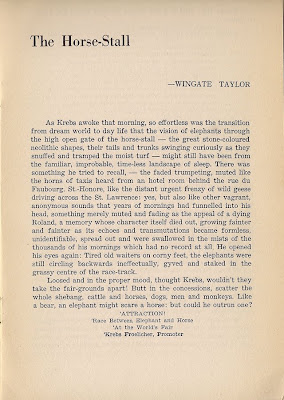THE HEART ACCEPTS IT ALL
SELECTED LETTERS OF JOHN GLASSCO
BOOK LAUNCH
Wednesday, 14 August 2013, 7:30 p.m.
THE WORD
467 Milton Street
Montreal
A JOURNEY THROUGH CANADA'S FORGOTTEN, NEGLECTED AND SUPPRESSED WRITING
The editor of this mag, John Sutherland, is a very decent chap, about 30, a pretty good drinker too...The April & May 1945 issue of influential Montreal little magazine First Statement. Irving Layton, A.M. Klein, Patrick Anderson, Ralph Gustafson, Miriam Waddington... amongst the lesser-known writers we find Wingate Taylor, "a farmer in the Eastern townships [sic] of Quebec." He's better remembered – though, in truth, he's barely remembered at all – as Graeme Taylor, the man who shares many adventures with John Glassco in Memoirs of Montparnasse.
– John Glassco, letter to Robert McAlmon, 16 August 1944

You wrote that you used to write as Brian John Busby. Someone called Brian John Busby wrote for a Canadian TV show called "Time of Your Life". Are you that Brian John Busby?Yes, I am. A low-budget, low-rent teen soap, Time of Your LIfe was my first paid writing gig.
The Dusty Bookcase:A Journey Through Canada'sForgotten, Neglected, and Suppressed Writing
 |
| Amongst Thistles and Thorns Austin C. Clarke Toronto: McClelland & Stewart, 1965 |
 |
| Collected Poems Austin Clarke London: Allen & Unwin, 1936 |
 |
| 2001: A Space Odyssey Arthur C. Clarke New York: New American Library, 1968 |
 |
| King's Explanatory Arithmetic Thomas King London: The Author [c. 1920] |
 |
| Merveilleux Voyage Lisa Moore Toronto: Harlequin, 1986 |
 |
| A Vision of Faery Land and Other Poems William Gibson Boston: Munroe & Co., 1853 |
 |
| Milk for Babes; or, A Catecism in Verse John Metcalf Northampton, MA: The Author, 1840 |
 |
| Execution Poems George Elliott Clarke Kentville, NS: Gaspereau, 2009 |
 |
| The Hasting Day George Frederick Clarke Toronto: Dent, 1930 |
 |
| David Cameron's Adventures George Frederick Clarke London: Blackie & Sons, [1950] |
 |
| David Cameron [David Cameron's Adventures] George F. Clarke [W. Joosten, trans.] Amsterdam: De Verkenner, 1953 |
In fact, Miss Cameron survived, dodging sailboats and steamers, only to succumb to pneumonia shortly after her return home to Victoria.Agnes Deans Cameron's Last Article"THE THAMES BY CANADIAN CANOE"
An increase of nine and three-quarter millions in population, a million and a half in dwellings, and three-quarters of a million in the number of farms would mean an increase in farm values of nearly two billions. And that's your particular "baby", isn't it? Increase your land values? Isn't that where you make your money? Isn't that the temptation that leads you into a new country?

